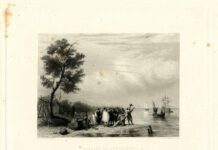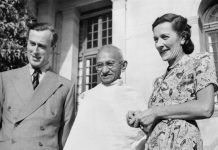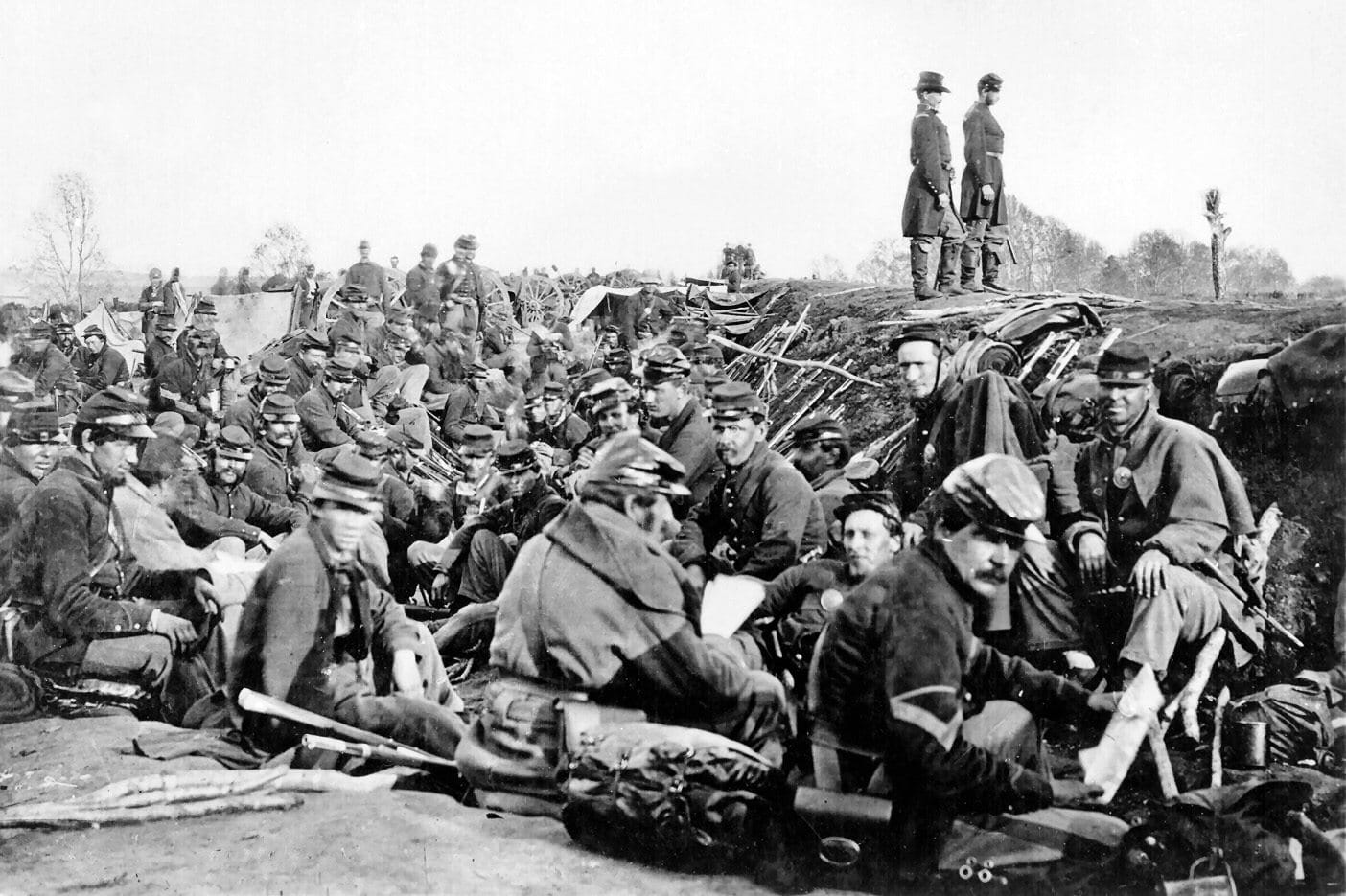
De første væbnede sammenstød i Den Amerikanske Borgerkrig starter 12. april 1861, da Konføderationsstyrker (Sydstaterne) angriber Fort Sumter i South Carolina. Sidste tropper fra Konføderationen overgiver sig til Unionen 23. juni 1865.
The first armed battles in the American Civil War starts 12 April 1861, when forces from the Confederation attacted Fort Sumer in South Carolina. The South troops surrender to the Union 23 June 1865.
Indhold
- Leksikalt / Overview
- Artikler mv. på engelsk / Articles etc. in English
- Emancipationserklæringen 1862 / The Emancipation proclamation
- Abraham Lincoln
- Steven Spielberg’s Lincoln
- Se også / See also
Se på Socialistisk Bibliotek / See at Socialist Library:
- Emneboxen: Slaveri / Slavery
- Personlisten: John Brown – Guerilla mod slaveriet
- Tidskinjen august 1619 om de første afrikaneres ankomst til Amerika
- Tidslinjen 3. september 1783 om Uafhængighedskrigen
- Tidslinjen 25. marts 1807 om det britiske forbud mod slavehandel
Leksikalt / Encyclopedias:
- Den Amerikanske Borgerkrig (Denstoredanske.dk)
- Amerikanske borgerkrig (Wikipedia.dk)
- American Civil War (Wikipedia.org)
- American Civil War (Spartacus Educational)
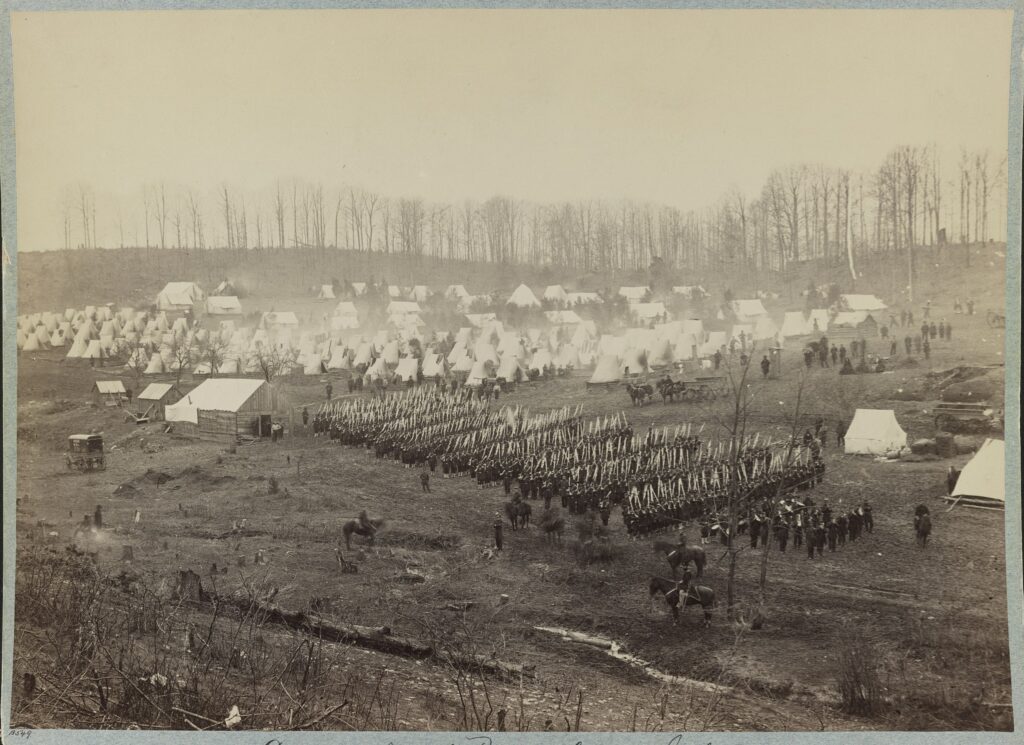
Artikler mv. / Articles etc.:
Den amerikanske borgerkrig 1861-65. Af Charlie Lywood (Socialistisk Arbejdervis, nr. 392, marts 2022) (Almindelige menneskers historie, del 22). “Da frivillige soldater fra South Carolina d. 12. april 1861 skød på føderale soldater i Fort Sommer, Charleston, udtrykte de, i dramatisk form, at slaveejerne i de sydlige stater i USA nægtede at acceptere Abraham Lincoln som præsident.”
The American Civil War. Chapter 57 in Neil Faulkner: A Marxist History of the World (Counterfire, 8 January 2012). “One hundred and fifty years ago North America saw the start of a revolutionary war fought between rival systems and opposing political ideologies.”
Podcast: The American Civil War: Revolution and Counterrevolution (Socialist Revolution, 15 June 2021). “The entire series is listed here, covering the background to the war, the events itself, the major players involved and the aftermath.”
The Civil War: America’s second revolution. By John Peterson (In Defence of Marxism, 10 February 2023). “The American Civil War is an event of world-historic significance. This revolutionary war, which consumed US society for four long and bloody years, overthrew slavery as a mode of exploitation and laid the ground for the rapid development of US capitalism.”
Did the Constitution pave the way to emancipation? By Richard Kreitner (The Nation, October 6, 2021). Review of James Oakes, The Crooked path to Abolition: Abraham Lincoln and the Antislavery Constitution (WW Norton, 2021, 288 p.): “In his new book James Oakes argues that the Constitution was an antislavery document.”
The “Irrepressible Conflict”: Slavery, the Civil War and America’s Second Revolution. By Eric London (World Socialist Web Site, 9 November 2019). “The purpose of this lecture series is to address the falsifications of the New York Times’ ‘1619 Project’ and undertake a historical materialist analysis of American history, and in this lecture, the Civil War.” See also interview with James McPherson: “Opposition to slavery has also been an important theme in American history” (ibid., 14 November 2019).
The right side: The revolutionary class politics of the Civil War. By James Oakes (The Nation, July 15, 2019). Review of Elizabeth R. Varon, Armies of Deliverance: A New History of the Civil War (Oxford University Press, 2019, 520 p.). “By naming a common enemy—the privileged class of slaveholders—the Republican Party and Union Army were able to build and then steer a coalition of Americans toward the systematic destruction of slavery.”
Ulysses S. Grant: American giant. By Matthew E. Stanley (Jacobin, 13 December 2018). “Ron Chernow’s new biography rehabilitates the great Civil War general and champion of Reconstruction. But it glosses over the central issues of labor and property that would stifle black equality for a century.”
Taming the Antislavery Revolution. By James Oakes (Jacobin, 11 December 2017). Review of Adam I.P. Smith, The Stormy Present: Conservatism and the Problem of Slavery in Northern Politics, 1846-1865 (Chapel Hill, 2017, 344 p.): “The Civil War wasn’t just a struggle against the South. It was an ideological battle within the heart of Northern society.”
A hard road to travel: black people and racism in the 19th century United States. By Ken Olende (International Socialism, Issue 156, Autumn 2017, p.141-169). “For half of the last century mainstream historians erased the part played by black people and radicals in the defeat of slavery.”
Slavery, War, and Revolution. By Kevin B. Anderson (Jacobin, 16 May 2017). Review of The Civil War in the United States, by Karl Marx and Friedrich Engels. Second edition. Ed. Andrew Zimmerman (International Publisher, 2016, 254 p.): “Marx’s Civil War writings wrestle with many of the issues that plague today’s left.”
Struggle and progress: Celebrating the 150th anniversary of Union victory and emancipation (Jacobin, Issue 18, Summer 2015). With articles online by Andre Fleche, Eric Foner, Alex Gourevitch, Eileen Jones, Bruce Levine, Heather Cox Richardson and Adolp Reed Jr.
Series: Slavery and the Civil War (SocialistWorker.org, April 9 – May 5, 2015). “One hundred and fifty years ago, the institution of slavery was finally destroyed with the end of the Civil War.” Six articles by Lance Selfa, Alan Maass, Bill Mullen and Donny Schraffenberger.
W.E.B. Du Bois, Black agency and the slaves’ Civil War. By Brian Kelly (International Socialist Review, Issue 100, Spring 2016, p.48-68). “For most of the century and a half that has passed since the end of the US Civil War, the four million African Americans held as slaves in the Confederate South were written out of any meaningful role in their own emancipation.”
The end of chattel slavery in American history: 150 years since ratification of the 13th Amendment. By Tom Mackaman (World Socialist Web Site, 8 December 2015). “The abolition of slavery in the US was an enormous step forward for the American and international working class.”
The mass politics of antislavery. By Matt Karp (Catalyst, Vol.3, No.2, Summer 2019). ” … the process leading up to the overthrow of slavery was neither the accidental byproduct of capitalist development, nor the triumph of an enlightened activist vanguard, but a battle waged and won in the field of democratic mass politics.”
The cinematic lost cause. By Eileen Jones (Jacobin, Issue 18, Summer 2015). “Why have so many films dealing with the Civil War embraced the Confederate struggle?”
How the British workers’ movement helped end slavery in America. Part 1-2. By Joe Mount (World Socialist Web Site (5-7 January 2015)
“British workers were conscious of their shared stake in the great democratic revolution being fought on battlefields across the Atlantic Ocean.”
Military Emancipation. By Connor Donegan (Against the Current, Issue 172, September-October 2014). Review of Bruce Levine, The Fall of the House of Dixie: The Civil War and the Social Revolution that Transformed the South (Random House, 2013, 303 p.) + James Oakes, Freedom National: The Destruction of Slavery in the United States, 1861-1865 (W.W. Norton & Company, 2013, 492 p.). “James Oakes and Bruce Levine have given us two new histories of that incredible episode which ought to be widely read.”
The Civil War in 1864. By Tom Mackaman (World Socialist Web Site, 23 May 2014). “The American Civil War entered its decisive phase 150 years ago, in the summer and fall of 1864.”
American Jacobins. By Seth Ackerman (Jacobin, No.7-8, 2012). “Why has the American left neglected this revolutionay inheritance?
See also debate:
The war of Northern aggression. By James Oakes (Jacobin, No.7-8, 2012). “A leading Civil War historian challenges the new orthodoxy about how slavery ended in America.”
A war of emancipation. By James Oakes (Jacobin, 25 September 2012). “The Republicans were emancipators – from start to finish.”
The Civil War reconsidered. By Charlie Post (Jacobin, 25 September 2012). “Jacobin’s symposium on ‘American Jacobins’ is a provocative reminder that the US Civil War and Reconstruction was a radical revolution.”
Spielberg’s ‘Lincoln’, Karl Marx, and the Second American Revolution. By Kevin Anderson (The International Marxist-Humanist, December 19, 2012). “The film ‘Lincoln’ shows the radicalization that had taken place in Civil War America by January 1865, with the Lincoln administration allying itself with the Radical Republicans to end slavery. At the same time, this Hollywood epic ignores both the economic/class dimensions and the warm exchange of letters between Marx’s First International and the Lincoln administration …”
Bourgeois Revolution and the US Civil War. By Neil Davidson (International Socialist Review, Issue 83, May 2012). “The main thing I want to talk about in that connection is the nature of the South, because this seems to me to be the crucial question in thinking about the Civil War as a bourgeois revolution.”
An unfinished revolution: Karl Marx and Abraham Lincoln. By Katherine Connelly (Counterfire, 5 April 2012). Review of Robin Blackburn, An Unfinished Revolution: Karl Marx and Abraham Lincoln (Verso, 2011, 260 p.). With Introduction by Robin Blackburn (p.1-100) and key texts and letters by Lincoln and Marx. “Robin Blackburn offers an exciting new perspective on Marx’s interpretation of the American Civil War that puts the question of slavery back at its heart.” See the book online (Libcom.org).
Lincoln for the Left? By Dave Wagner (Counterpunch, February 10, 2015). Interviews with Paul Buhle about his new book Lincoln For Beginners …“. A view on the American historians and Lincoln/the Civil War.
Symposium on Karl Marx and the US Civil War (Historical Materialism, Vol.19, No.4, 2011, p.33-205). “On the occasion of the 150th anniversary of the beginning of the American Civil War, Historical Materialism has brought together some of the most significant Marxist scholars working in this area to debate the issues. This text introduces some of the questions raised by the Civil War and Southern slavery for Marxists.” With articles by Steve Edwards, John Ashworth, Charles Post, Neil Davidson, Robin Blackburn, August H. Nimtz and Eric Foner. See here online:
Karl Marx and Abraham Lincoln: A curious convergence (pdf). By Robin Blackburn (online at Edisciplinas.usp.br, p.145-174).
Marx and Engels on the US Civil War: The ‘Materialist conception of history’ in action (pdf). By Agust H. Nimtz (online at Academia.edu, p.169-192).
Karl Marx and the American Civil War. By Donny Schraffenberger (International Socialist Review, Issue 80, November-December 2011). “A look at Marx and Engels’ writing during the Civil War reveals some remarkably powerful insights into that conflict.”
On the dialectics of race and class: Marx’s Civil War writings, 150 years later. By Kevin Anderson (The International Marxist-Humanist, October 21, 2011). “Marx’s dialectic of race and class is related to that of Frantz Fanon and to the Civil War in the U.S., which unleashed many revolutionary possibilities.”
Slavery and the origins of the Civil War. By James Illingworth (International Socialist Review, Issue 78, July-August 2011). “The Civil War remains one of the most misunderstood episodes in American history. Unfortunately, this is just as true on the left as it is on the right.”
The American Civil War: war against slavery (Socialist Worker, Issue 2248, 19 April 2011; online at Internet Archive). “150 years after the American Civil War began, Matthew Cookson looks back at the significance of the conflict – and examines what really lay behind it.”
An eerie silence. By Robin Blackburn (CounterPunch, April 18, 2011). On the muted 150 years anniversary: “The news and entertainment media love anniversaries. So it is strange that the 150th anniversary of the start of the Civil War has been so low key. The BBC has a regular item each evening explaining the Secession crisis, in contrast to the shrugs of the US channels.”
One hundred and fifty years since the US Civil War. By Tom Eley and David North (World Socialist Web Site, 13 April 2011). “This week marks the 150th anniversary of the Confederate attack on federal soldiers at Fort Sumter, in South Carolina, which began the Civil War between the Union and the Confederacy – an epochal event in American and world history.”
The struggle that set the stage for a Civil War (SocialistWorker.org, April 12, 2011). “The opening shots of the American Civil War were fired 150 years ago today – but as Alan Maass explains, the abolitionists’ war on slavery began decades before.”
The war that became a revolution (Socialist Review, Issue 357, April 2011; online at Internet Archive). “The US Civil War began 150 years ago in April 1861. It ended with the abolition of slavery in the Southern states. Mark L Thomas spoke to historian James McPherson about this turning point in US history.”
Slavery and the Civil War (SocialistWorker.org, February 24, 2011). “A century and a half after the opening shots of the Civil War, James Illingworth dispels the myths about the Southern slaveocracy and the war that liberated slaves.”
Classics of Marxism: W.E.B. Du Bois, Black Reconstruction in America 1860–1880. Review by Keeanga-Yamahtta Taylor (International Socialist Review, Issue 57, January–February 2008). “The Civil War resulted in a pitched battle to determine the future course of American politics and society, a battle that continues to reverberate today. W.E.B. Du Bois’s book is an epic retelling of that history. Written in 1935, Black Reconstruction literally rewrote the official history of the Civil War and Reconstruction eras.”
The Civil War as Revolution, Part I-V (Wig-Wags: Journal of a graduate student in military history and the American Civil War. Blog by Rene Tyree, 2007)
Architects of their own liberation. By Michael Bradley (Socialist Review, Issue 318, October 2007). “Much has been written about the American Civil War, but less is known about the decisive role of black soldiers in the conflict. Michael Bradley unearths the role of free blacks and escaped slaves whose heroism helped secure victory against the Confederate South and ended slavery.”
The Second American Revolution (Chapter IV in Alan Woods: Marxism and the United States, Wellred, 2005). “Like every other serious conflict, at bottom the American Civil War was a class struggle. The Northern manufacturers necessarily had to come into conflict with the Southern landowning classes. The conflict of interest between the two lasted for sixty years and finally ended in civil war.”
An uncivil war. By Gareth Jenkins (Socialist Review, Issue 286, June 2004). Review of August Nimtz, Marx, Tocqueville, and Race in America (Lexington Books, 2003). “Hence, on the one hand, the First International, under Marx’s inspiration, marshalled support for Lincoln … On the other hand, American communists, mostly German veterans of the 1848 revolutions, organised to win the ideological battle among workers to support black liberation … this is a splendid book which every activist should read and learn from.”
How the US Civil War became ‘a remorseless revolutionary struggle’. By David Walsh (World Socialist Web Site, 28 February 2003). “A recent conversation with historian James McPherson was prompted by two events: the appearance of Martin Scorsese’s Gangs of New York, which purports to deal with an episode of the Civil War, and the publication of McPherson’s most recent work, Crossroads of Freedom: Antietam, which studies one of the turning points in that same conflict.”
The Civil War, impeachment then and now and Lincoln’s legacy, Part 1. By David Walsh (World Socialist Web Site, 19 May 1999) + Part 2 (20 May) + Part 3 (21 May). “David Walsh recently spoke to James McPherson, the distinguished historian of the Civil War era. Professor McPherson’s works include Abraham Lincoln and the Second American Revolution; Battle Cry of Freedom; For Cause and Comrades: Why Men Fought in the Civil War and The Struggle for Equality.”
Clash of two systems. By Chris Harman (Socialist Worker Review, No.131, May 1990, p.25-26; online at Marxists’ Internet Archive). Review of James M. McPherson, Battle Cry of Freedom (Penguin, 1990). “… there are occasions in which the forces of reaction cannot hold the line indefinitely, however skilled they are and however unskilled their opponents. The battle between the exploiters of free labour and of slavery in America was one such occasion.”
Civil War and Reconstruction in the U.S.: primitive accumulation and the bourgeois revolution (1844-1877) (pdf). By Charles Post (IIRE Working Papers, Issue 5, December 1989, 28 p.). “This essay synthesizes much of the existing literature … into a Marxist analysis of the second U.S. bourgeois democratic revolution.” See also: Roots of U.S. Capitalism. By Bruce Levine (Against the Current, Issue 156, January-February 2012) + Political Marxism and the rise of American capitalism. By Ashley Smith (International Socialist Review, Issue 78, July 2011). Reviews of Charles Post, The American Road to Capitalism: Studies in Class-Structure, Economic Development and Political Conflict, 1620-1877 (Brill, 2011, 298 p.). See the book online at Libcom.org
Marx and Engels on the Civil War. By George Novack (New International, Vol.IV, No.2, February 1938). “Engels called the American Civil War ‘the first grand war of contemporaneous history’. Marx later hailed it as ‘the greatest event of the age’ … The Second American Revolution stands out as the decisive turning point of Nineteenth century history.”
Marx and Engels: Writings on the U.S. Civil War (Marxists Internet Archive)
Twenty-nine articles from Die Presse and New-York Daily Tribune, 1861-1862.
Marx on Slavery and the U.S. Civil War (Internationalist Group Class Readings, February 2008, 23 p.; online at Marxists Internet Archive)
Marx’s Letter to Abraham Lincoln. Address of the International Working Men’s Association to Abraham Lincoln, President of the United States of America. Presented to U.S. Ambassador Charles Francis Adams. January 28, 1865. (Marxists Internet Archive)
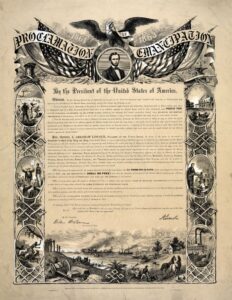
Emancipationserklæringen / Emancipation Proclamation
USAs præsident Abraham Lincoln erklærer 22. september 1862 alle slaver i sydstaterne fri fra den 1. januar 1863, og forvandler den (nord)amerikanske borgerkrig fra en kamp for unionen til en kamp om slaveriet.
US president Lincoln proclaimed (22 September 1862) all slaves from the Southern Statens free and thereby transformed the (north)American civil war from a struggle for the Union to a struggle on slavery
- Emancipationserklæringen (Wikipedia.dk). With links to a longer article in English/ on Emancipation Proclamation
- Preliminary Emancipation Proclamation, September 22, 1862 + The Emancipation Proclamation, January 1, 1863 (Archive.org)
- Video: The Emancipation Proclamation videos. … the Emancipation Proclamation had both moral and strategic implications for the ongoing Civil War.”
150 years since Lincoln’s Gettysburg Address. By Tom Mackaman (World Socialist Web Site, 19 November 2013). “In just 271 words, comprising ten sentences, in remarks lasting scarcely over two minutes, Lincoln placed the battle, the war and history itself in the context of the struggle for human equality.”
The contemporary significance of the Declaration of Independence and the Battle of Gettysburg: Two milestones in world history. By Joseph Kishore (World Socialist Web Site, 1 July 2013). “The Battle of Gettysburg did not end the Civil War, which would continue for two more years. It was, however, a turning point in the struggle against slavery in the United States.”
150 years since the Emancipation Proclamation. By Tom Mackaman (World Socialist Web Site, 3 January 2013). “The Emancipation Proclamation turned the Civil War into a social revolution. It transformed the struggle, waged by the North until then as a war to preserve the Union as it had existed in 1860, into a war for the destruction of slavery and the social and political order that rested upon it.”
‘A bombshell on the American public’. By James M. McPherson (The New York Review of Books, Vol.59, No.18, November 22, 2012). “The four historians whose books are reviewed here have written about 1862 in a manner that is perhaps neither entirely calm nor impartial, but quite suitable to the tumultuous atmosphere of wartime crisis that pervaded the era.”
Interview with historian James McPherson: 150 years since the Emancipation Proclamation. By Tom Mackaman (World Socialist Web Site, 29 October 2012)
Igniting a war to free the slaves (SocialistWorker.org, October 10, 2012). “The unveiling of the Emancipation Proclamation 150 years ago this fall marked a turning point in the history of the American Civil War, writes James Illingworth.”
Proclaiming the end of slavery (Socialist Review, Issue 372, September 2012). “On the 150th anniversary Camilla Royle looks back at this crucial turning point in the American Civil War.”
150 years since the Battle of Antietam: Prelude to the Emancipation Proclamation. By Tom Mackaman (World Socialist Web Site, 17 September 2012). “One hundred fifty years ago … the armies of the Union and the Confederacy met by Antietam Creek, near Sharpsburg, Maryland. The battle that ensued remains the bloodiest single day for US troops in American military history … Yet the significance of the Battle of Antietam goes far beyond its casualty toll.”
How slavery was ended: Civil war and Reconstruction. By Keeanga-Yamahtta Taylor (Socialist Worker, US, Issue 662, February 15, 2008). “The American Civil War from 1861 to 1865 and the Reconstruction era that followed completed the revolution, smashing the 254-year-old system of slavery in the American South and transforming Southern society.”
The enduring significance of the Emancipation Proclamation. By Shannon Jones (World Socialist Web Site, 2 June 2004). Review article of Allen C. Guelzo, Lincoln’s Emancipation Proclamation: The End of Slavery in America (Simon & Schuster, 2004): “This work, the first major treatment on the Emancipation Proclamation in 40 years, is well written and highly informative.”
Some thoughts on The Emancipation Proclamation. By George Novack (International Socialist Review, Vol.24, No.2, Spring 1963; online at Marxists Internet Archive). “Despite the restraint in this restatement of his guiding line, Lincoln had reached the point where he could no longer withstand the fierce pressure of emancipationist sentiment.”
Abraham Lincoln
Senere præsident nr. 16 i USA Abraham Lincoln fødes 12. februar 1809 i Sinking Spring Farm, Hardin County, Kentucky (myrdet 15. april 1865 i Ford’s Theater, Washington, D.C.)
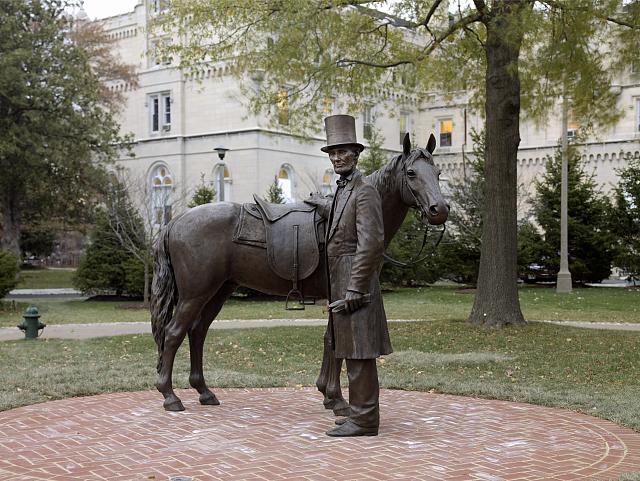
- Abraham Lincoln (Denstoredanske.dk)
- Abraham Lincoln (Wikipedia.dk)
- Abraham Lincoln (Wikipedia.org)
Lincoln och den andra amerikanska revolutionen (pdf). Av Per Leander (Marxistarkiv.se). “Följande två artiklar, ursprungligen publicerade i Internationalen, behandlar dels Lincolns politiska handlingar och revolutionen, och därefter hur bilden av Lincoln har framhållits och förändrats i USA efter hans död.”
Abraham Lincoln is a hero of the Left. By Mattew E. Stanley (Jacobin, February 20, 2023). “From Karl Marx to Eugene Debs to 1930s American Communists, leftists have regarded Lincoln as a prolabor hero who played a crucial role in vanquishing chattel slavery. We should celebrate him today as part of the great radical democratic tradition.”
Lincoln, the Dakota 38 and the racialist falsification of history. By Renae Cassimeda (World Socialist Web Site, 9 November 2020). “On October 11, protesters in Portland, Oregon tore down a statue of Abraham Lincoln, leaving the phrase ‘Dakota 38’ spray painted at its base.”
How Abraham Lincoln fought the Supreme Court. By Matt Karp (Jacobin, September 19, 2020). “It is not enough to question the decisions, the justices, or even the structure of the current court — we need to challenge, as Abraham Lincoln did, the foundation of its power to determine the law.”
Hands off Lincoln and the Emancipation Memorial! Defend the legacy of the Civil War! By Niles Niemuth (World Socialist Web Site, 3 July 2020). “The unanimous decision of the Boston Art Commission to remove the statue of Abraham Lincoln and a freed slave which memorializes emancipation, is a reactionary assault on the progressive legacy of the Civil War.” See also Jacob Crosse: Racialist campaign in Boston culminates in removal of statue of Lincoln and emancipated slave (Ibid., 31 December 2020).
Every Drop of Blood: The Momentous Second Inauguration of Abraham Lincoln. By Shannon Jones (World Socialist Web Site, 11 June 2020). Review of Edward Achorn’s book (Atlantic Monthly Press, 2020, 416 p.). “Lincoln’s Second Inaugural Address [1865] is counted as one of his most memorable speeches. Containing just 700 words, it is inscribed in stone in the Lincoln Memorial in Washington, DC, along with the Gettysburg Address.” See also interview with Edward Achorn (Ibid., 10 July 2020).
Oxford historian Richard Carwardine on the New York Times’ 1619 Project: “A preposterous and one-dimensional reading of the American past”. By Tom Mackaman (World Socialist Web Site, 31 December 2019). “Richard Carwardine, professor emeritus at Oxford University, is the author of the Lincoln-award winning biography Lincoln: A Life of Purpose and Power ...”
150 years since the assassination of Abraham Lincoln. By Tom Mackaman (World Socialist Web Site, 14 April 2015). “In office, Lincoln guided the Civil War and transformed it from a struggle for the preservation of the Union into a revolutionary war for the abolition of slavery.”
Lincoln for the Left? (CounterPunch, February 10, 2015). Dave Wagner interviews Paul Buhle about his new book Lincoln For Beginners, with comic art by Sharon Rudahl and a preface by Eric Foner (Comic Book, 2015, 167 p.)
Lincoln, slavery, and the American Civil War. By Neil Faulkner (Counterfire, 30 January 2013). “The American Revolution and the American Civil War represent the two phases of the bourgeois revolution that created modern America. Racism, sexism, and class exploitation remained – and still remain – central features of American life. But that should not detract from our appreciation of how history was driven forwards by determined revolutionary leadership in ‘the fiery trial’ of 1861-1865.”
The role of Lincoln’s Republican Party in ending slavery. By James Illingworth (International Socialist Review, Issue 90, July 2013). Review of James Oakes, Freedom National: The Destruction of Slavery in the United States, 1861–1865 (W.W. Norton & Company, 2012, 596 p.). “Freedom National is certainly Oakes’s most important work to date. Over the course of almost five hundred pages it provides one of the most detailed narratives yet written on the advent of emancipation as a northern war aim between 1861 and 1865.”
Understanding Lincoln: An interview with historian Allen Guelzo (World Socialist Web Site, 3 April 2013). “Allen Guelzo is the author of numerous books, including Abraham Lincoln: Redeemer President and Lincoln’s Emancipation Proclamation: The End of Slavery in America and Fateful Lightning: A New History of the Civil War and Reconstruction.”
Reading Karl Marx with Abraham Lincoln: Utopian socialists, German communists, and other republicans. By John Nichols (International Socialist Review, Issue 79, September-October 2011). “In a chapter from his new book The “S” Word, John Nichols discusses the relationship between Karl Marx, German exiles in the United States, and Abraham Lincoln.”
150 years ago: The election of Abraham Lincoln touches off secession crisis. By Shannon Jones (World Socialist Web Site, 24 December 2010). “Though not an abolitionist, Lincoln was an opponent of slavery and determined to use all means at his disposal to stop its spread.”
Lincoln’s black history. By Garry Wills (The New York Review of Books, Vol.56, No.10, June 11, 2009). Review of Henry Louis Gates Jr., and Donald Yacovone (eds.), Lincoln on Race and Slavery (Princeton University Press, 2009). “Abraham Lincoln was born into a racist family, in a racist region of our country, during a racist era of our history. It would have been amazing if he had not begun his life as a racist … Gates thinks that this quantitative approach – how much racism did Lincoln exhibit at any time? – should be replaced by a qualitative question: What kinds of racism are at issue?”
Honor Abraham Lincoln! By Bert Mason (Workers Vanguard, No.938, 5 June 2009). “Many opponents of revolutionary Marxism, from black nationalists to reformist leftists, have made a virtual cottage industry out of the slander that ‘Honest Abe’ was a racist or even a white-supremacist.”
Lincoln and the struggle to abolish slavery. By Alan Maass (Socialist Worker, February 12, 2009). “Lincoln’s importance in history wasn’t as an abolitionist thinker – he did, indeed, hold backward ideas about race compared to other opponents of slavery – or as an organizer for the cause, but in the role he played in a specific historical situation.”
In honor of the bicentenary of Abraham Lincoln and Charles Darwin. By Tom Eley (World Socialist Web Site, 12 February 2009). “Lincoln played a central role in one of the great progressive struggles of modern history. The Civil War arose inexorably out of the fundamental contradictions left unresolved by the first American Revolution, which had proclaimed in stirring language the equality of man, and which had sanctioned the use of revolution to destroy all forms of tyranny.”
Forced Into Glory: Abraham Lincoln’s White Dream. By Eric Foner (Los Angeles Times Book Review, April 9, 2000). Review of Lerone Bennett, Jr.’s book (Johnson Publishing, 2000). “Which was the real Lincoln – the racist or the opponent of slavery? The unavoidable answer is: both. Bennett cannot accept that it was possible in nineteenth- century America to share the racial prejudices of the time, and yet simultaneously believe that slavery was a crime that ought to be abolished.”
See also review by James M. McPherson: Lincoln the devil (The New York Times, August 27, 2000). “This book must be taken seriously. Bennett gets some things right. Lincoln did share the racial prejudices of his time and place … But Bennett gets more wrong than he gets right. The book suffers from crucial flaws.”
The two sides of Abraham Lincoln. By J.R. Johnson [ie. CLR James] (The Militant, 14 February 1949). “Enemy of the slave-power, a friend to the people. That was one side of Lincoln. But there was another which was widely known and commented upon in his own day.”
Address of the International Working Men’s Association to Abraham Lincoln, President of the United States of America (November 1864). By Karl Marx (Marxists Internet Archive). “We congratulate the American people upon your re-election by a large majority. If resistance to the Slave Power was the reserved watchword of your first election, the triumphant war cry of your re-election is Death to Slavery.”
See also Marx and Engels: Writings on the U.S. Civil War (Marxists Internet Archive)
Steven Spielberg’s ‘Lincoln’
- Lincoln (2012 film) (Wikipedia.org)
- Mr. Spielberg’s Mr. Lincoln. By Chuck Kleinhans (Jump Cut, No.55, Fall 2013). “Political opinions on Lincoln, ranging from conservatives who admired or hated the film, with the same spectrum on the left.” With many links.
- Lincoln in contemporary U.S. culture and politics. By Douglas Kellner (Jump Cut, No.55, Fall 2013)
- Equality before the law in Spielberg’s Lincoln. By Gary Bettinson and Richard Rushton (Jump Cut, No.55, Fall 2013)
- Lincoln: shared myths in a revisionist age. By Frederick Wasser (Jump Cut, No.55, Fall 2013)
- The significance of Steven Spielberg’s Old Mr. Lincoln – political emotions and intertextual knowledge. By Janet Staiger (Jump Cut, No.55, Fall 2013)
- Lincoln, slavery, and the American Civil War. By Neil Faulkner (Counterfire, 30 January 2013)
- Spielberg’s ‘Lincoln’, Karl Marx, and the Second American Revolution. By Kevin Anderson (The International Marxist-Humanist, December 19, 2012)
- A filmmaker’s imagination, and a historian’s. By Kate Masur (The Cronicle of Higher Education, November 30, 2012)
- Paternalism and ass-Covering in Spielberg’s ‘Lincoln’. By Louis Proyect (CounterPunch, November 30, 2012)
- The great uncompromiser. By Alan Maass (SocialistWorker.org, November 29, 2012)
- The trouble with Steven Spielberg’s ‘Lincoln’. By Jon Wiener (The Nation, November 26, 2012)
- Steven Spielberg’s ‘Lincoln’ and the historical drama of the Civil War. By Tom Mackaman (World Socialist Web Site, 12 November 2012)
- ‘Lincoln’ against the radicals. By Aaron Bady (Jacobin, November 26, 2012)
Se også / See also
The failure of Reconstruction is to blame for the weakness of American democracy. By Matthew E. Stanley (Jacobin, December 8, 2022). Review of Review of Jeremi Suri, Civil War by Other Means: America’s Long and Unfinished Fight for Democracy (PublicAffairs, 2022). “A new book argues that the American right emerged out of a backlash to multiracial democracy following the Civil War. This is only partly true: reactionaries did not just fear democracy, they feared the economic redistribution former slaves associated with it.”
When Radicals ran the U.S. Congress. By Mark Lause (Against the Current, Issue 218, May-June 2022). Review of Bruce Levine, Thaddeus Stevens: Civil War Revolutionary, Fighter for Racial Justice (Simon & Schuster, 2021, 336 p.). “Levine’s Thaddeus Stevens offered a surgically focused biography of the’public man’, shed of any preoccupations about answering the legion of rumors arrayed against his personal life and motives. He offers useful insights into some of what shaped his subject’s view of the world early in life.”
The American ruling class has never let us build back better. By Ryan Moore (Jacobin, November 18, 2021). “The nation’s original failure to ‘build back better’ was Reconstruction, the attempt to radically remake society in the wake of the Civil War. Then as now, the most powerful people in the country went out of their way to maintain the status quo.”
The Southern slaveholders dreamed of a slaveholding empire (Jacobin, September 21, 2021). An interview with Kevin Waite: “Antebellum slaveholders weren’t content with an economic and social system based on trafficking in human flesh in the South alone. They wanted to expand slaveholding territory outward, to the American West and even beyond the borders of the United States.”
Thaddeus Stevens: Bourgeois Revolutionary. By Bruce Levine (Against the Current, Issue 214, September-October 2021). “Recognizing early on that the fight against the secessionists had created a revolutionary situation, Stevens began deliberately to formulate a revolutionary response to it and to demand its implementation. At each stage in the war’s evolution, Stevens pressed the populace and politicians (including Lincoln) for greater antislavery radicalism.”
“The Danton, Robespierre, and Marat of America, all rolled into one”: A new biography of antislavery leader Thaddeus Stevens. By Fred Mazelis (World Socialist Web Site, 30 April 2021). Review of Bruce Levine, Thaddeus Stevens: Civil War Revolutionary, Fighter for Racial Justice (Simon and Schuster, 2021, 320 p.). “Bruce Levine has provided a political biography of the leader of the Radical Republicans in Congress during the Civil War and the early years of Reconstruction that should help to bring this revolutionary figure broader recognition.”
The mass politics of antislavery. By Matt Karp (Catalyst, Vol.3, No.2, Summer 2019). “This essay argues that the process leading up to the overthrow of slavery was neither the accidental byproduct of capitalist development, nor the triumph of an enlightened activist vanguard, but a battle waged and won in the field of democratic mass politics.” See interview with Matt Karp: How the antislavery movement ignited a political revolution (Jacobin, July 30, 2020).
Reconstruction in the USA: Black freedom denied. Part 1 (Counterfire, June 20, 2020) + Part 2 (Ibid., June 22). “John Westmoreland explores the successes of Reconstruction, and the subsequent attempt to airbrush them from history.”
Ida B. Wells, democratic rights, and lynch mob sexual assault accusations against African-Americans. By Eric London (World Socialist Web Site, 21 November 2017). Review of Richard White, The Republic For Which It Stands: The United States During Reconstruction and the Gilded Age, 1865-1896 (Oxford University Press, 2017, 968 p.).
Workers against slavery: The American Civil War, the First International and the British working class (pdf). By Sacha Ismail (Worker’s Liberty, 2015, 27 p.). “In the 1860s, an internationalist and anti-racist struggle – support for the battles against black slavery in America – was central to the revival of the British labour movement …”
Bookwatch: Fighting to unite Black and White. By Lee Sustar (International Socialism, Issue 71, Summer 1996, p.155-165). “A number of books written over decades and from a variety of political viewpoints do enable us to trace the tradition of black and white unity.”
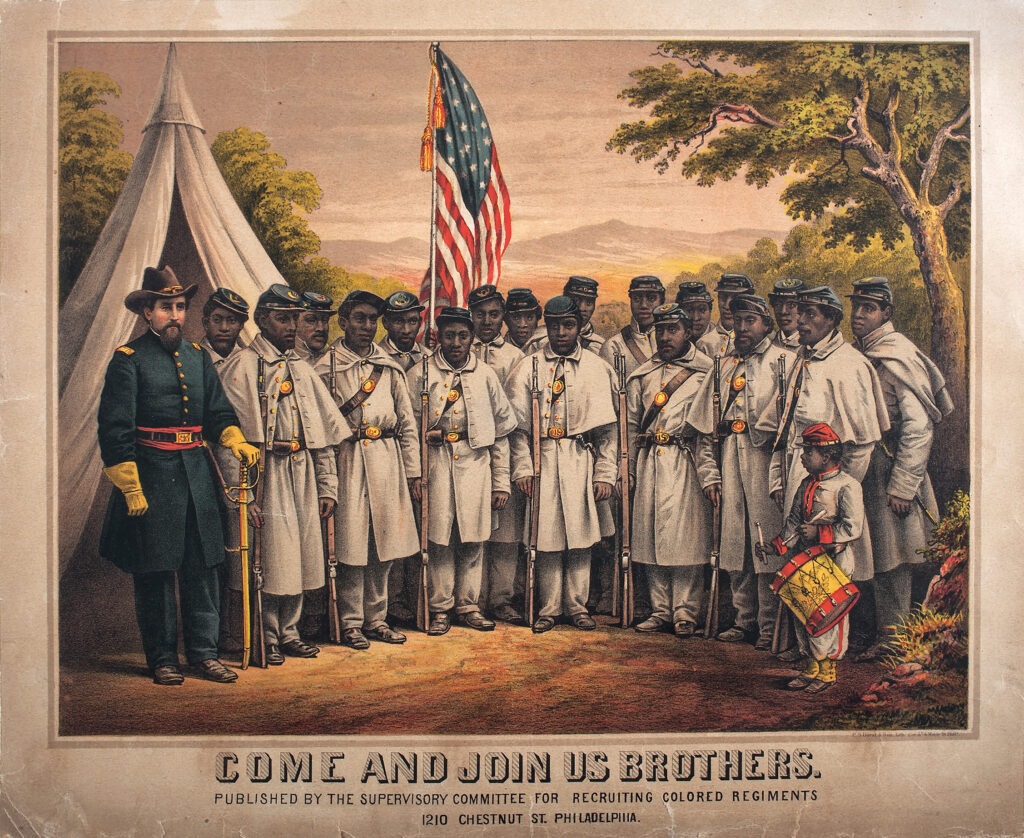
“Before 1862, a black regiment had been unheard of in the U.S. But on July 17, 1862, the Second Constitution and Militia Act was the first official authorization to employ Africans in federal service. In fall of 1862, there were at least 3 union regiments of Africans in New Orleans. In 1865, four million slaves were neither slaves nor citizens before the 14th Amendment was past. Slave holding states became a multimillion dollar industry in the 19th century. Americans lost more than 300,000 men in the Civil War. An Illinois lawyer states ‘Liberty and slavery civilization and barbarism, one or the other must perish’.” (Source: CivilWarSides)


















